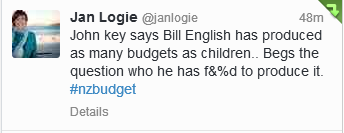It’s been almost a year since I wrote anything here. Things have been complicated. Anyway, this will — I hope, and circumstances permitting — begin a return to participation. All thanks due to Pablo for holding things together.

Answer: Nobody. That’s the problem.
Today was budget day. The carnage in Australia with Joe Hockey’s first budget two days ago was worse than even the Abbott government’s enemies had predicted, with deep cuts to education, welfare, superannuation, science funding and many other fields, including the imposition of a $7 surcharge for GP visits. The contrast here could not be more stark: a return to surplus not immediately thrust into lowering taxes, modest cuts in some areas, increased entitlements in others, particularly in support for young families, and notably the extension of free GP visits to children under 13 years of age.
I’m no big-city economist so I’ll stick mainly to the political aspects. But it basically looks like Bill English’s sixth budget — somewhat like the preceding five, but to a greater extent — does a little good and almost no evil, and that basically ruins the opposition’s game plan, which relies on Bill English and John Key being terrible ogres that eat babies, rather than supporting their parents with leave entitlements. When the man touted as the Labour party’s most left-wing leader in a generation is reduced to complaining that John Key has stolen his party’s policy — as if that is supposed to be a bad thing — things are pretty dire. The opposition’s increasing desperation over the past six years, continuously prognosticating doom over the horizon, simply looks ridiculous when the doom never arrives. The government has snookered the New Zealand left by simply doing what it said it would do, and as Pablo argued persuasively at the start of the year, that makes clear how lacking the New Zealand left is in its strategic vision. They — Labour especially — are relying on the government to do their heavy ideological lifting, and when the government declines to be explicitly evil, the opposition is left with nothing to say.
When your enemies move to occupy your ideological ground, it is an opportunity to extend that ground, replacing what they claim from you with more advantageous ground deeper within your ideological territory. The trouble for Labour is that National has moved towards them, and Labour are still trying to fight them for the same ground rather than staking out more ground of their own. Six years after the “Labour lite” campaign that saw them ousted in the first place, they haven’t learned. Today’s budget has been tagged Labour lite by commentators including Bryce Edwards and Labour’s own Rob Salmond.
Due to assiduous work by National, and a conspicuous lack of it by Labour, “Labour lite” is now more or less indistinguishable from “Labour”, and Labour has offered no sort of “Labour heavy”; full-cream Labour, deep-red Labour, or whatever other metaphor you like. Because of this lack of difference, the electoral decision comes down to competence: of these two groups of mendacious grey technocrats, which is the least likely to inadvertently screw things up, or intentionally, as Jan Logie puts it, f&%k people over? That’s an easy answer: Labour demonstrates its lack of general competence every single day. If it’s not clear by now that they’re simply not as good at being the Nats as the Nats are, when will it ever be?
It’s too late, now, to change this ahead of the election. The die is cast. Labour has — again — decided to rely on political meta-strategy like syllogising failures of judgement or conduct by individual MPs out to the wider government, and it might have worked had they any sort of foundation to build upon. But they don’t. Far from full-cream Labour, Labour itself is Labour lite. Light-blue, even; 98% Ideology-free. If they’re going to play the National-lite game, they at least need to get good at it.
L
